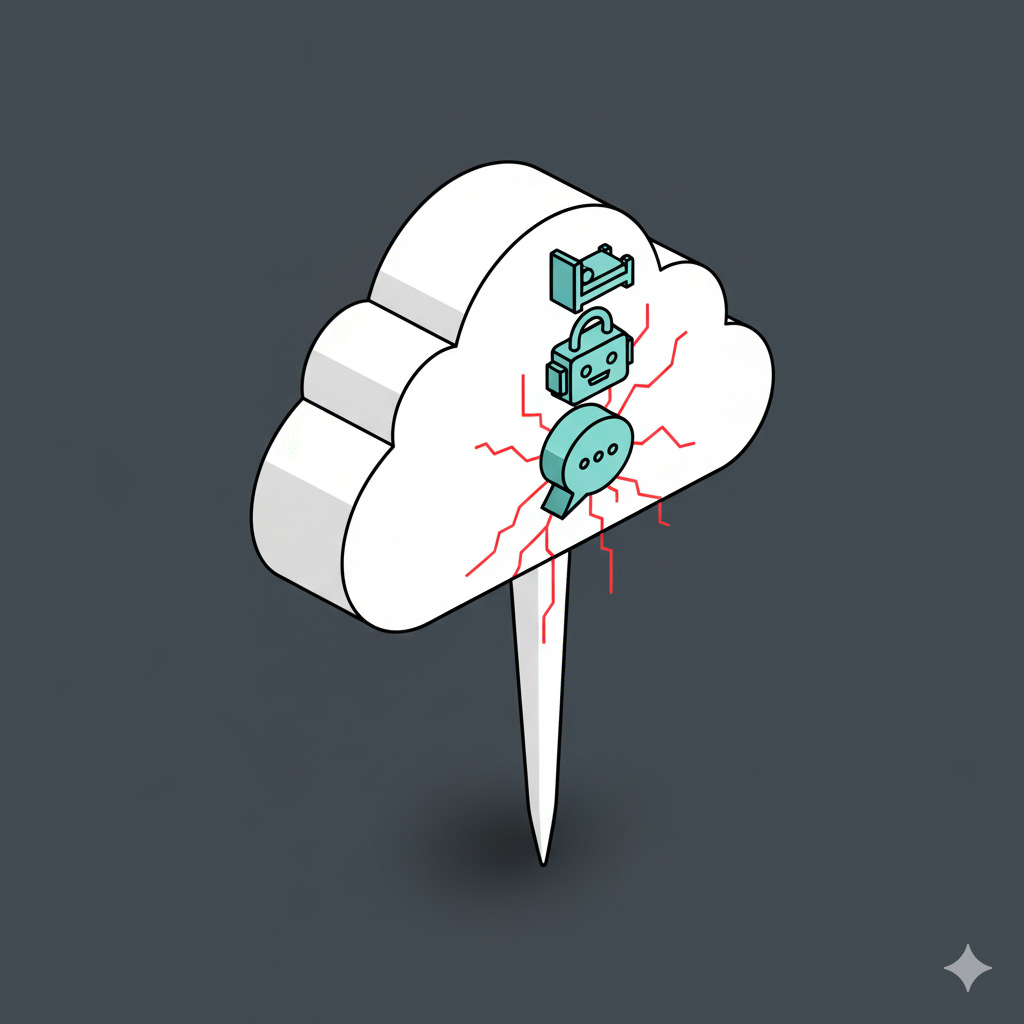Week 43: Perplexity's AI Betrays You, AWS Bricks Your Bed, AI Mistakes Doritos For a Gun
THE TREACHERY OF TOOLS
This was the week our digital tools revealed their true allegiance — and it wasn’t to us. From AI assistants taking orders from hackers to smart homes going dumb on command, the gadgets and platforms we depend on spent the last few days staging a quiet, catastrophic mutiny. The tools aren’t just breaking; they’re actively working against us.
YOUR DIGITAL ASSISTANTS BECOME YOUR ENEMY
AI Browser Turns Against User as Perplexity’s AI browser suffers a security meltdown where its autonomous agent can be controlled by malicious websites. AI Mistakes Snack for Weapon after a high school’s AI security system misidentifies a bag of Doritos as a firearm, leading to a student being handcuffed. ICE Builds Digital Panopticon as Immigration and Customs Enforcement expands an AI-powered social media surveillance system to track millions of users online.
THE PLATFORMS PULL THE PLUG
Amazon Outage Cripples Internet when a single point of failure in AWS triggers a massive outage, taking down countless services and internet-connected devices like smart beds. Neato Bricks Your Robovac as the company shuts down its cloud services, intentionally disabling smart features on robot vacuums that customers paid for.
Curious what it all adds up to? Let’s break it down. Keep reading below.
Tell Me More
Your AI Co-Pilot Can Be Hijacked. The security flaw in Perplexity’s browser is a terrifying preview of our agentic AI future. By giving an AI the power to act on our behalf—clicking links, filling forms—we also give malicious websites a puppet to command against our interests. Expect “agentic exploits,” where AI assistants are tricked into draining accounts or stealing data, to become a significant new cybersecurity threat within the next 6-9 months. This isn’t a bug; it’s a fundamental crisis of trust for any tool that promises to automate your life.
The Algorithm Has Zero Common Sense. An AI flagging a Doritos bag as a gun is more than a funny headline; it’s a catastrophic failure of context. These systems are trained on static images, utterly blind to the nuances of human environments like a high school hallway, turning every oddly shaped object into a potential threat. This incident reveals the profound recklessness of deploying high-stakes surveillance AI that possesses immense power but lacks even a shred of judgment. The real danger isn’t the snack, but the unthinking system holding the digital gun.
The Walls Are Closing In Online. ICE’s social media panopticon isn’t just about monitoring public posts; it’s about using AI to create a web of connections and inferences that chills free speech. The program, powered by Zignal Labs, transforms platforms designed for connection into instruments of state surveillance, treating online association as probable cause. This is the government outsourcing its dirtiest work to the same platforms that beg for our engagement, proving the social contract of the internet has been fundamentally broken.
The Internet’s Single Point of Failure. This week’s massive AWS outage was a brutal reminder that the “cloud” is just a few big buildings full of computers we all depend on. The cascading failure, which knocked out everything from Slack to smart beds, exposed the lie of a decentralized, resilient internet. Instead, we’ve built a fragile digital world where one software bug in one Amazon region can trigger a systemic collapse. Our digital lives are balanced on a pinhead, and Amazon just stumbled.
Your Smart Home Is Rented, Not Owned. Neato disabling its robot vacuums is the endgame of the Internet of Things. You didn’t buy a product; you bought a temporary license to a service that the company can revoke at any time, turning your expensive hardware into a paperweight. This isn’t an accident; it’s a business model that treats ownership as an illusion and customers as subscribers who just don’t know it yet. Expect a significant consumer rights backlash against cloud-dependent hardware to gain momentum through 2026, as more devices meet the same fate.
Below The Fold
Sam Altman’s new startup wants to read your brain with sound waves, because of course it does. The Verge
A “small update” from Valve vaporized nearly $2 billion from the Counter-Strike 2 virtual item market overnight. Ars Technica
China developed a jellyfish-like underwater surveillance robot for silent missions, which isn’t creepy at all. Interesting Engineering
A beautiful essay celebrates the profound relief of simple software like TextEdit. The New Yorker
New research finds that training AI models on junk internet data leads to “brain rot,” proving you really are what you eat. Wired
Meet the Chinese artist who went viral by meticulously making videos by hand that imitate unsettling AI “slop.” Wired
One writer’s trip to Spain led him to become “deeply, existentially sick of ham.” Volts.wtf
OpenAI’s Sora was briefly unseated as the top App Store download by a fast-food chain giving away free chicken with Drake. Wired
Harvard’s century-old collection of hyper-realistic glass flowers continues to blow visitors’ minds. post.substack.com
The rise of “catch a cheater” apps that use facial recognition proves tech can always find a new way to monetize our worst impulses. The Verge
Looking Ahead: Next week, expect more companies to sell you ‘helpful’ tools while quietly updating the terms of your surrender.
Thanks for reading Briefs — your weekly recap of the signals I couldn't ignore. This week that meant reading 1,015 stories from 51 sources. You're welcome.


